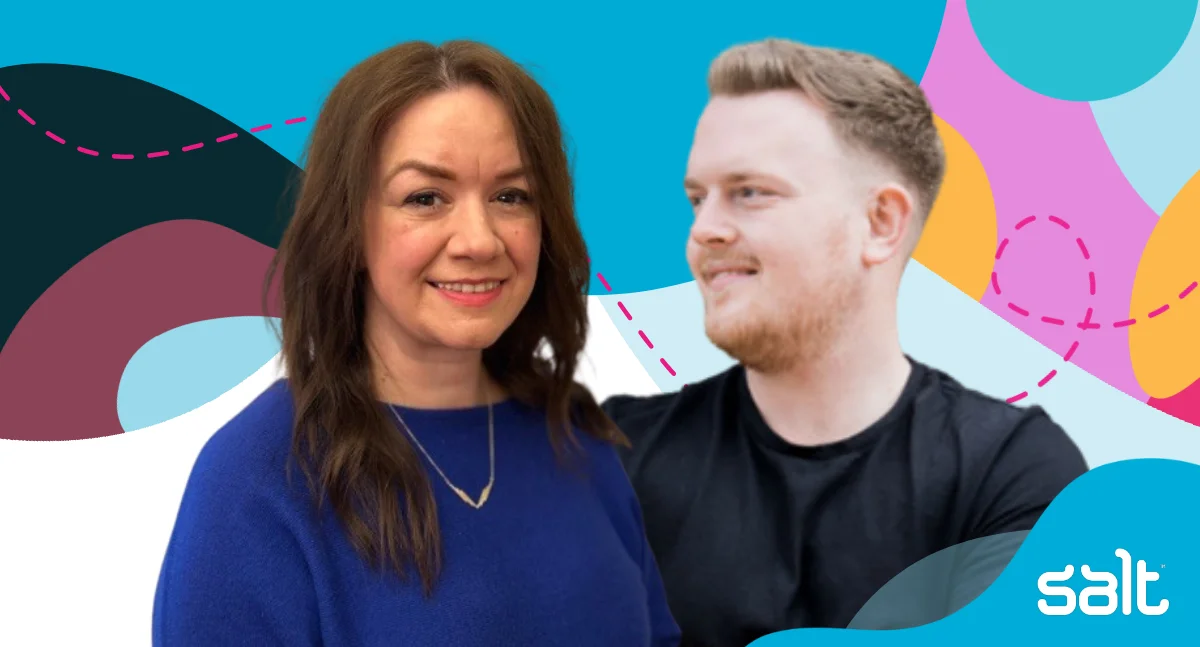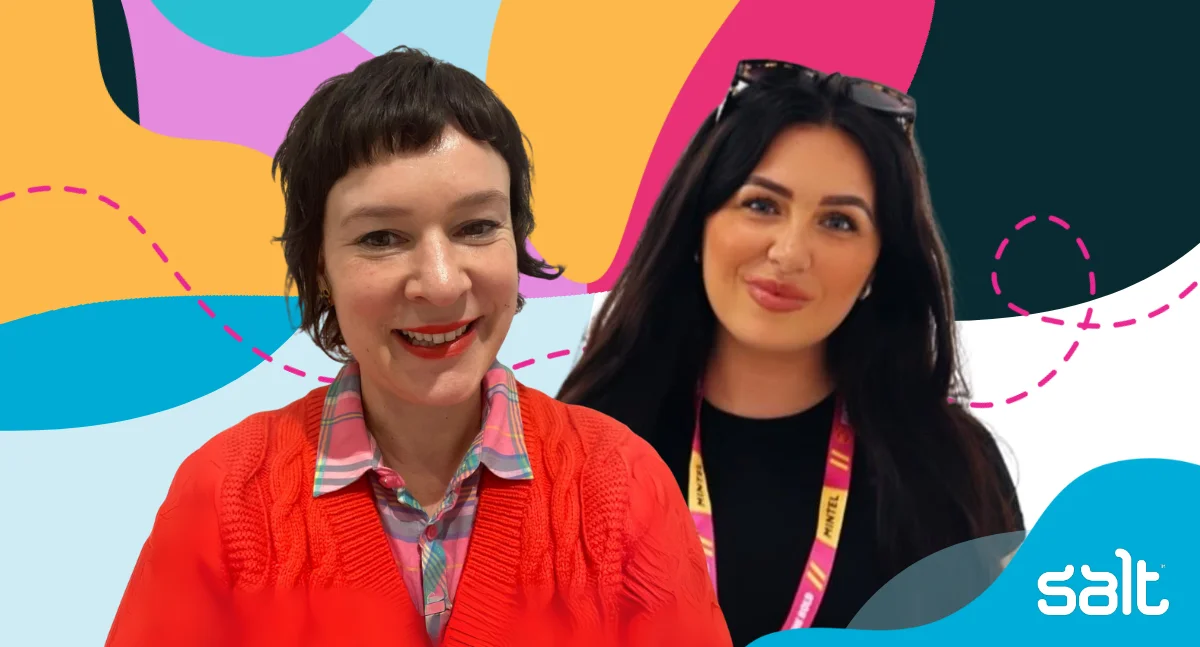
For Salt’s latest Women in Tech interview, we caught up with
Gudrun Palmer, Director in the Technology Consulting practice of a global consulting firm, to talk diversity and advice on creating an inclusive workplace.
The #SaltSessions Women in Tech #WiT interview series speaks with thought leaders from around the world to get their opinion and advice on how they have grown their career in tech, and overcome challenges and adversity during their career.
What is your current role and the most exciting part of your work?
I am currently a Director in the Technology Consulting practice
of a global consulting firm. What I love most about the role is the opportunity to work with some of the best young talent in the industry. The bar is extremely high for internship and graduate entry, and it is a real pleasure to see these young people thrive and grow.
What has been your most career defining moment that you are proud of?
When I proved myself worthy of running the European operation
of a technology consultancy business based in London and Amsterdam. I had two women in my leadership team running
each country’s operation and a fantastically talented team of consultants.
What do you think we should be doing more of to encourage more girls to consider a career in tech?
We need to help grow the understanding that technology covers a broad spectrum of activities and you don’t necessarily have to be a “geek” to be successful and grow in tech. There is room for many different kinds of people with a wide range of skills, and my job now is as much about people and processes as it is about technology. Soft skills are as important as the hard technology skills, and we should be demonstrating the many different sides
to a technology career to encourage more diversity in every dimension. This should also include encouraging girls to focus
on being deep technologists if that’s what they want to be. They should not feel that they need to apologise for wanting to be “that geek” and follow a technical career.
What challenges have you faced in the workplace, especially your experience in male-dominated environments?
In my experience you have to work harder to be taken seriously. Women often have more soft skills and emotional intelligence which are an important part of the overall mix in a team, but those skills are not always recognised in a testosterone-fuelled environment. Some women respond by being more masculine
in their behaviour, but the real challenge is finding a way to be
true to yourself and still be successful.
What is the biggest deterrent in your opinion to women succeeding in the workplace?
I think it is often the women themselves. I see women who are ready for a promotion, but won’t apply for a role unless they tick all the boxes — they tend to be far more analytical about their fit to the role. While I see men in similar positions with similar skills, “going for it” and then being more successful.
Who has been your biggest advocate/mentor in your career and why?
When I joined PwC in London in 1997 (then Price Waterhouse) one of the attractions of the role was the opportunity to work for a female partner, rare at the time. She was an amazing mentor; fearless, driven and very successful in the largely masculine environment of financial services consulting. She helped me understand the ways in which a woman can still be true to
herself and succeed in business without behaving like a man.
She was a true inspiration.
One piece of advice that I never forgot was when I picked up a spiral bound notebook from the stationery cupboard (one that flips on the top edge used for taking shorthand notes) and opened it in an internal meeting. She immediately said, “Put that away — it makes you look like a secretary!”. No insult to secretaries intended! The real lesson was the importance of the image you portray, and wish to portray, in all aspects of your professional career. I will never forget that message, and still don’t use those notebooks!
As an employer, what would you recommend to other companies regarding infrastructure to have in place to develop the best talent?
It starts with the hiring process — you have to recruit people who not only have the technical skills for the job, but who are also aligned with the company’s culture i.e. the desired target culture. Gaps in technical skills can be covered by training; cultural misalignment is harder to combat.
I am a great believer in nurturing talent and the power of coaching with a structured process in place. Not everyone is a natural coach and I would recommend aligning people with the most appropriate coach regardless of hierarchy. At a previous employer, I had the good fortune of having the services of a third party professional coach and I would encourage companies to consider doing the same.
You should also pay attention to team dynamics. You don’t want everyone in your team to be like you.
The strongest teams thrive on diversity in all its aspects, bringing different perspectives and balancing different strengths. It raises the capabilities of a team beyond the sum of its parts.
In a management position, how have you found it best to promote and nurture women’s careers?
By coaching women to help them understand that it’s okay to be themselves and not feel like they have to behave as a man in order to thrive in a man’s world.
I take inspiration from my home country, Iceland, which has been ranked by the World Economic Forum as the global leader on reducing gender inequality. On 1st January 2018, the country fully enacted the world’s first equal pay law which requires companies to obtain certification to confirm that equal pay is a reality for all employees, regardless of gender. In other countries, the dialogue on equal pay still revolves around the notion that women on average are paid less because they are not aggressive enough when it comes to negotiating salary, and therefore, it is their own fault. It is essential that women feel confident enough to negotiate in the workplace — asking for what you want and deserve will impact you far more than just the number on your payslip.
What are some of the best and worst workplace initiatives you have seen/heard of to help promote diversity?
I don’t subscribe to the notion of quotas. I see them as an attempt to force diversity where all other approaches fail and is in danger of being seen as “tokenism” or necessary just for PR purposes. Instead, I have seen managers and coaches actively encouraging women in their team to apply for roles based on their capabilities. This is where the job of a coach is critical to making sure that potential future talent isn’t missed.
How has COVID-19 affected the way you work?
Video calls have become an integral part of the day! I insist on cameras on wherever possible. A background of children, pets and untidy room is more human and can be used to take the tension out of stressful conversations. I have heard a common theme, that the day is much more intense with back-to-back calls and video meetings, and little time for “water cooler moments” or walking between locations to break up the day. I have been trying to balance this by stepping outside of my home office and doing something completely different for a short while; if only to go for a walk or do some other form of exercise. The most difficult part is to give myself permission to do this — to avoid feeling guilty if I’m not spending every moment “working”. Recharging your batteries is important to bring out your best, and we need to remember to be kind to ourselves as well as to others.
What changes do you foresee in the workplace in the next 12 months?
This is a paradigm shift. There is no going back on the possibilities of working remotely and working from home will become a regular “thing” even in those professions where traditionally this would not have been seen as a practical option. This will also have a significant impact in a number of areas including transportation, where commuting will take a different shape, and the housing market where people will have more choices of where to live without needing to consider regular commuting.
Who is your modern-day hero?
Steve (Stephanie) Shirley who founded F International in the early 1960s to provide meaningful home-based employment for young mothers with software skills. The company grew to be a major software services firm and is now part of Sopra Steria.
Any reading/website you would recommend to stay updated?
To keep up on business trends, I like reading the Harvard Business Review — well-written and insightful.
For current affairs, I use the BBC website and app to stay in touch with what’s going on in the UK. For a different perspective, the New Zealand Herald website provides a uniquely kiwi take on local and world events.
There are a lot of personal development books out there, and I have picked up and put down many, but I particularly enjoyed The Chimp Paradox by Prof Steve Peters where he discusses how you can sabotage your own success and how to train your mind to deal with that.
What is your biggest stress reliever?
I relieve stress by stepping away from the work environment to use a completely different part of the brain. I have enjoyed exploring my local area in daily lockdown walks and have recently started practising yoga in the fresh air on the deck when the weather allows. I love watching rugby, so living in New Zealand is a joy once lockdown rules allow live matches again. With a musical background, I sometimes immerse myself in my Hammond keyboard, and have now just started to and teach myself to
play the ukulele as a new challenge.
Is there one piece of advice you wish somebody gave you at the beginning of your career?
It is okay to have a career plan but don’t be a slave to it. Be prepared to go with the flow and change directions without seeing it as a failure. Be clear on life goals and make sure your career aligns. Stay open-minded and embrace change; don’t fear it. Oh, and don’t just follow the money!
What job did you dream of when you were a kid — your Plan A career path?
I had many ideas which changed frequently.
Primarily I wanted to work in travel — in the airline business or tourism. My father was an aircraft engineer, so I grew up with airline crews frequently visiting and I worked as a ground stewardess for a while myself.
I had a passing desire to be an architect after we built our own house as a family when I was a teenager, and am still fascinated by building designs. Might explain why I enjoy software design.
I also wanted to be a professional musician — either a classical pianist or a rock star; and I tried a little bit of both before deciding it wasn’t for me. I realised I was never going to be famous, at least for that!
Strangely enough, I think working in technology brings many of those things together and although I only briefly worked in travel, I have made up for it with frequent business trips all over the world where I had the immense privilege of working with incredible global teams.
Fun fact about you?
Because Iceland has such a rich education heritage and historically high literacy, I can trace my family tree back to the first settlers of Iceland in 874 AD and even a bit beyond, including finding a few drops of royal blood in there! It is humbling to see yourself in the context of all the people who have gone before and be reminded that you are just a tiny leaf on that tree.
About Gudrun
Gudrun is Icelandic by birth, educated in the UK and has worked in technology leadership roles in a number of countries around the world. Now, Gudrun proudly spends her time living and working in New Zealand having moved to Auckland in March 2019.
Hers was not a conventional career journey. With a Bachelor of Psychology (Honours) and also having studied modern languages, statistics, biology, and music; Gudrun entered the technology sector after randomly taking a computer programming aptitude test as part of a graduate job search where she scored 98%!
A recruitment agent suggested that a career in IT might be a good thing! She subsequently took part in a corporate IT graduate scheme, which started with a strong grounding in software programming and subsequently moved into technology leadership roles, as well as consulting for many different companies to help them leverage technology as an enabler for business change.
Her experience includes delivery of integrated technology solutions across the full customer lifecycle in both private and public sector including Healthcare, Commercial Property, Professional Services, FMCG/CPG, Financial Services,
Hospitality, Telecommunications, and Retail in both large
and small organisations.
Looking for some more inspirational reads?
Check out more from our Women in Tech interview series and Females in FinTech interviews .
To shape your future with Salt, a leading digital recruitment agency, send your CV to enquiry@welovesalt.com or use our search to find Technology jobs. You can also keep in the loop by following us on LinkedIn, Facebook, Instagram and Twitter.


